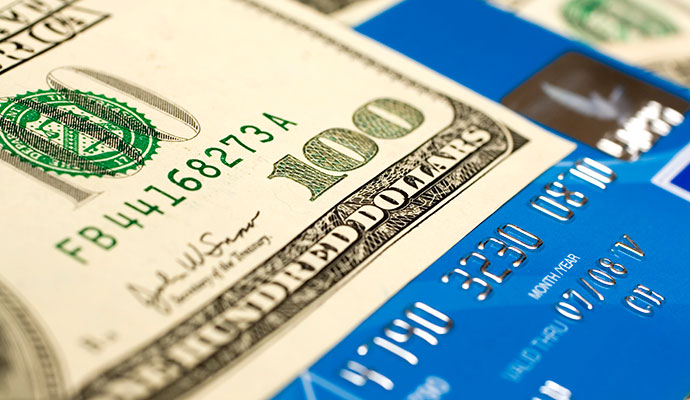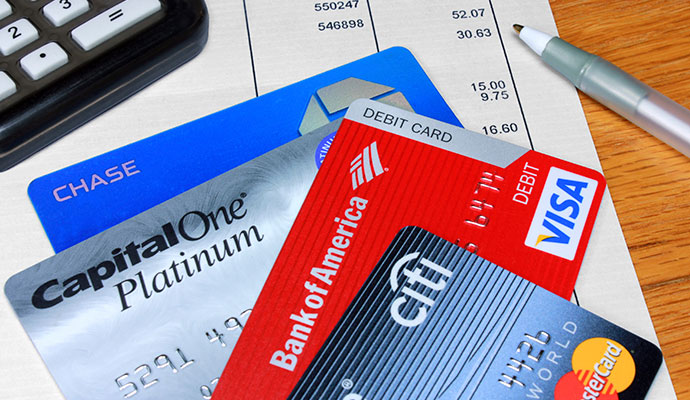7 tricks for getting the most out of your credit card points
Know the small print

A free daily email with the biggest news stories of the day – and the best features from TheWeek.com
You are now subscribed
Your newsletter sign-up was successful

Michelle Schroeder knows how to make the most of her money.
Not only did the 25-year-old from St. Louis finish her undergraduate degree in just two and a half years, but she also bought her first house at 20 — thanks to the savings she and her husband built up from working full-time in college.
So it's no surprise that when she heard friends talk about redeeming their credit card points for free trips to Europe, the fiscally responsible overachiever wasted no time signing up for a rewards card of her own.
The Week
Escape your echo chamber. Get the facts behind the news, plus analysis from multiple perspectives.

Sign up for The Week's Free Newsletters
From our morning news briefing to a weekly Good News Newsletter, get the best of The Week delivered directly to your inbox.
From our morning news briefing to a weekly Good News Newsletter, get the best of The Week delivered directly to your inbox.
"I've always had good credit, and I pay my card balance in full each month," she says. "So I figured I should switch to a card that gave me something in return."
When she did, Schroeder started reaping the rewards immediately.
After being approved for a co-branded airline credit card, she snagged 50,000 "sign-up bonus" points that she combined with the 40,000 she'd already accrued by flying with the carrier the previous year. The result: a total of 90,000 points she cashed in to fly herself and five friends to Las Vegas — for free.
Hank Lobel, a CFP® at LearnVest Planning Services, says Schroeder is a shining example of how to smartly use a rewards card. "If you have good credit — and a proven track record of being responsible with credit cards — you'd be crazy not to take free money," he says.
A free daily email with the biggest news stories of the day – and the best features from TheWeek.com
But these benefits also come with caveats — and aren't always as good as they may seem. "Knowing the fine print that a lot of people miss when signing up can help you watch out for the 'gotchas' that come along with the 'gimmes,' " Lobel says.
To help you distinguish between the two, we tapped Lobel and three other money pros to reveal some of the most common rewards card misconceptions — and insider tips for reaping the biggest benefits.
1. Rewards cards aren't one-size-fits-all
Credit card companies save their savviest marketing tactics for cards with the biggest bonuses, luring consumers in with promises of access to exclusive events and five-figure batches of miles — but the card with the most eye-popping deal may not be the card that's best for you.
"A lot of people just sign up for the first card that sounds good," says Curtis Arnold, founder of CardRatings.com. "But devoting some time on the front end to weighing your options and finding the card that's the best fit is crucial."
One way to do that, Arnold says, is to shop around for credit cards with rewards programs tied to what you tend to spend the most on. For instance, if you have a long daily commute, you might benefit from a card that offers 5 percent cash back on gas purchases.
Alternatively, if you're the hands-off type and just can't see yourself sifting through airline blackout dates to redeem travel miles or a drawer full of expiring rewards gift cards, you might be better off opting for a card with a no-hassle cash-back bonus any time you swipe.
2. You should redeem rewards more often than you think

Fact: Billions of rewards points go unclaimed each year. And that's why John Ulzheimer, a credit pro from CreditSesame.com, says it's important to redeem your rewards at least several times a year.
Sure, in some cases, cashing in bigger denominations — say, 9,000 points for a $100 gift card, as opposed to 5,000 for a $50 card — yields a bigger return. But Ulzheimer maintains that you won't get any bang for your buck if you don't make an effort to redeem your rewards before they expire.
"By claiming rewards for small items, like a $25 gift card, you know you're always getting the value of the program. Many consumers just spend, spend, spend — and never end up claiming those rewards," Ulzheimer says.
3. Your card likely comes with high interest rates and fees
Racking up rewards is great — but completely futile if you're paying fees that outweigh the benefits. It's a misunderstanding Natalie Taylor, a CFP® at LearnVest Planning Services, encounters often with clients who love to score points yet fork over hefty interest payments for their revolving debt.
In these cases, she says, the typical reward redemption value is about 1 percent of what you paid to earn it. "That means if your interest rate is greater than 1 percent, then the credit card company is getting the better end of the deal," she adds.
Another thing to look out for? Make sure any annual fees you're paying don't add up to more than the rewards you're reaping.
For example, Ulzhemier says his airline card comes with a "ridiculously expensive" yearly fee of $450, but he still thinks it's worth it because the particular miles he earns allow him to upgrade to first class more frequently. Plus, "it also gets me one free companion round-trip ticket and unlimited access to the lounge, with free food, drinks, and WiFi," he says. "To me, those benefits easily outweigh the annual fee."
If you do find that your fee is teetering on the edge of canceling out your benefits, Arnold says you may have luck making a quick phone call to your credit card company to see if you can renegotiate an annual fee that's a little more manageable.
4. You need to be flexible about time periods
So you've signed up for a card that'll score you airline miles. But when you go to book your family's flight home for Thanksgiving, you realize that you're stuck in a "blackout period" and can't use them. Well, that's annoying.
"The truth is you really need to be flexible in order to use rewards, especially when it comes to air travel," says Lobel, adding that racking up miles is usually best for those who often travel during off-peak times.
Another fine-print point that's easy to overlook: In order to score the highest percent cash-back, you might have to make certain purchases during a designated time period — or what companies call "rotating categories."
For example, you might earn 5 percent on groceries from January through March, and then come April the 5 percent offer will only be eligible on purchases made at a certain retailer. "This can be really confusing, and you've got to be pretty on top of the rotating categories — which most people simply don't have time for," Arnold says.
So ask yourself: Are you really willing to regularly go online and shift your spending habits according to the category that will give you the most rewards?
"A lot of times, a card that gives you a 'plain Jane' 2 percent back across all categories is going to be better than a gimmicky 5 percent back with rotating rewards categories," Arnold says. "With so many caveats that come with these cards, you really have to look at the big picture if you want to come out ahead."
5. "Churning" can be rewarding — but only for certain users

Credit card "churning" almost sounds too good to be true: Find a few credit cards with a splashy sign-up bonus or promotion, meet the minimum spending requirement — like swiping your card to the tune of $5,000 over the course of three months — collect those points and then close the card.
Do this enough and the next thing you know you're packing your bags for a "free" Tahiti vacation. Right?
Not exactly. For most people, "churning" is too good to be true. "The only people who should even consider it are those with excellent credit, who pay off cards on time and who are comfortable with the spending requirements that come with bonus offers," Lobel says.
In fact, he likens churning to day trading. "You have to have the time, knowledge, inclination, and resources in order to do it," Lobel says. "And for every person who tells you about their riches, there are thousands of others who get no added benefit — or worse, hurt themselves."
That's because applying for so many cards may mean it's impossible not to wreck your credit — at least in the short term. "When multiple credit card companies do 'hard pulls' on your credit, it lowers your credit score," Lobel says. "Then, as you start using that credit, your score slowly buoys back up."
Lobel, Arnold and Ulzheimer all agree that "churning" isn't a good idea for most consumers. Over the long haul, you'll do better to take the time you'd otherwise spend on credit applications and sign-up scheming — and figure out ways to earn extra income instead.
6. Some debit cards have rewards programs too
No credit card? No problem.
If you're wary of paying with plastic because you don't have a great track record of spending within your means, that doesn't necessarily disqualify you from participating in rewards programs.
A growing number of companies are offering debit cards with rewards, with most of these programs giving you one point or dollar for every $2 in purchases you make with the card. "So you may not get as much as you would with credit — but you're at least getting something," Arnold says.
7. Rewards cards can spur you to spend more
It's basic human psychology: Offer something that sounds like a good deal, and most people will be more willing to buy it — even if they don't need it.
Credit card companies that offer rewards are masters at capitalizing on this kind of thinking, says Lobel. "Despite being a financial planner, I still get sucked into how many points I earn," he admits. "And I'm at times tempted to justify some of my spending with the fact that I'm getting something in return."
And that's exactly what the credit card companies are hoping you'll do.
But you don't have to feel duped, says Lobel, who recommends taking a close look at what you've earned, compared to how you've spent. "When I see 1,000 points, I get pretty excited," he says. "But then I'll do the math. Those 1,000 points equal about $10 — and I had to spend $1,000 to get them. Not such a great deal."
So before you justify dropping an extra $500 on that flat-screen TV "because you'll get points for it," remember you're spending $500 for something akin to a kickback that's equivalent to a medium-sized gingerbread latte.
"It's a great way to realize the golden rule when it comes to all rewards cards," Lobel says. "You'll always come out ahead if you stick to a budget."
This story was originally published on LearnVest. LearnVest is a program for your money. Read their stories and use their tools at LearnVest.com.
More from LearnVest...
-
 AI surgical tools might be injuring patients
AI surgical tools might be injuring patientsUnder the Radar More than 1,300 AI-assisted medical devices have FDA approval
-
 9 products to jazz up your letters and cards
9 products to jazz up your letters and cardsThe Week Recommends Get the write stuff
-
 ‘Zero trimester’ influencers believe a healthy pregnancy is a choice
‘Zero trimester’ influencers believe a healthy pregnancy is a choiceThe Explainer Is prepping during the preconception period the answer for hopeful couples?